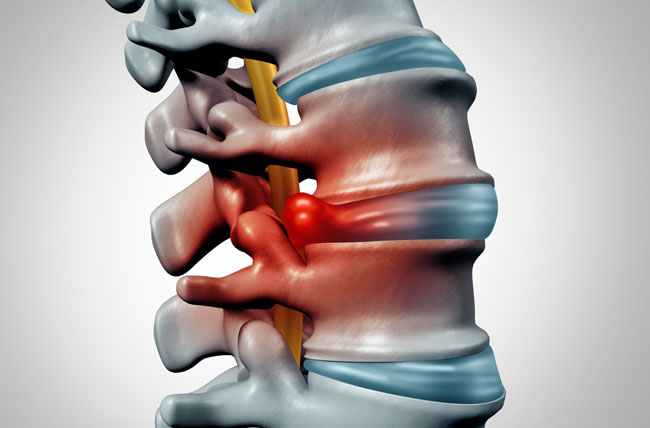Kalra Brain & Spine
At KBS, we treat our patients as neighbors, friends, and family. Our goal is to educate you, treat your symptoms, and help you recover as fast as possible
Herniated Disc
The spine is made up of bones called vertebrae and a rubbery cushion between each vertebra called discs. A herniated disc occurs when the soft inner portion of the disc is pushed out through the exterior border. A herniated disc can occur in the neck or the back and often is the result of trauma or excessive strain.
Symptoms
Symptoms of a herniated disc usually present on just one side of the body and can vary depending on the location of the herniation. Depending on the severity of the herniated disc, there may be little to no pain to severe pain. Symptoms can include sensory and/or motor changes such as:
- Tingling
- Numbness
- Sharp pains
- Weakness
As we age, the discs in our spine can lose flexibility and elasticity. The ligaments surrounding the discs can become brittle and are more easily torn. When a herniated disc occurs, it can put pressure on nearby spinal nerves (radiculopathy) or the spinal cord (myelopathy), causing painful symptoms.
Most people can’t pinpoint the exact cause of their herniated disc. Sometimes, using your back muscles instead of your leg and thigh muscles to lift heavy objects can lead to a herniated disc, as can twisting and turning while lifting. A traumatic event such as a fall or a blow to the back may also be the cause.
Factors that can increase your risk of a herniated disc include:
- Weight. Excess body weight causes extra strain on the discs in your lower back.
- Occupation. People with physically demanding jobs have a greater risk of back problems. Repetitive lifting, pulling, pushing, bending sideways and twisting also can increase your risk of a herniated disc.
- Smoking. It’s thought that smoking reduces the oxygen supply to the disc, causing it to break down more quickly.
Treatment Options
In many cases, conservative treatment, such as rest, modifying movement and taking over-the-counter pain medications (acetaminophen, ibuprofen or naproxen sodium), offers relief of symptoms. For more serious instances of herniated disc, Dr. Kalra may recommend:
- Cortisone injections. If your pain doesn’t improve with the use of oral medications, Dr. Kalra might recommend a corticosteroid that can be injected into the area around the spinal nerves.
- Muscle relaxers. You might be prescribed these if you have muscle spasms.
- Opioids. Because of the side effects of opioids and the potential for addiction, many doctors hesitate to prescribe them for disc herniation.
- Physical Therapy. Dr. Kalra might suggest physical therapy to help with your pain. Physical therapists can show you positions and exercises designed to minimize the pain of a herniated disc.
Surgery
Dr. Kalra will only suggest surgery after all other treatment methods have failed to bring sufficient relief especially if you continue to have:
- Poorly controlled pain
- Numbness or weakness
- Difficulty standing or walking
Surgical intervention can include:
- Microdiscectomy. The affected disc is removed to relieve pressure on the nerve.
- Laminotomy. A portion of the lamina is removed to relieve pressure on the affected nerve.
- Laminectomy. The entire lamina is removed to relieve pressure on the affected nerve.
New Hope From a Spine Expert
When world-class training meets hometown values deeply rooted in family and community, the result is the kind of medical care you’ve always hoped for. This describes Kalra Brain & Spine, the practice of Dr. Ricky Kalra, who specializes in the most up-to-date evidence-based neurological care. If your condition requires neurosurgery, schedule a consultation with Dr. Kalra today.
Request an Appointment
Contact us
Get In Touch
Address
Kalra Brain & Spine
5899 Preston Road
Suite 1303
Frisco, TX 75034
Phone
972-905-9226

Fax
972-905-9269

